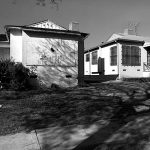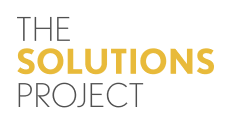Youth Voter Engagement in South Los Angeles
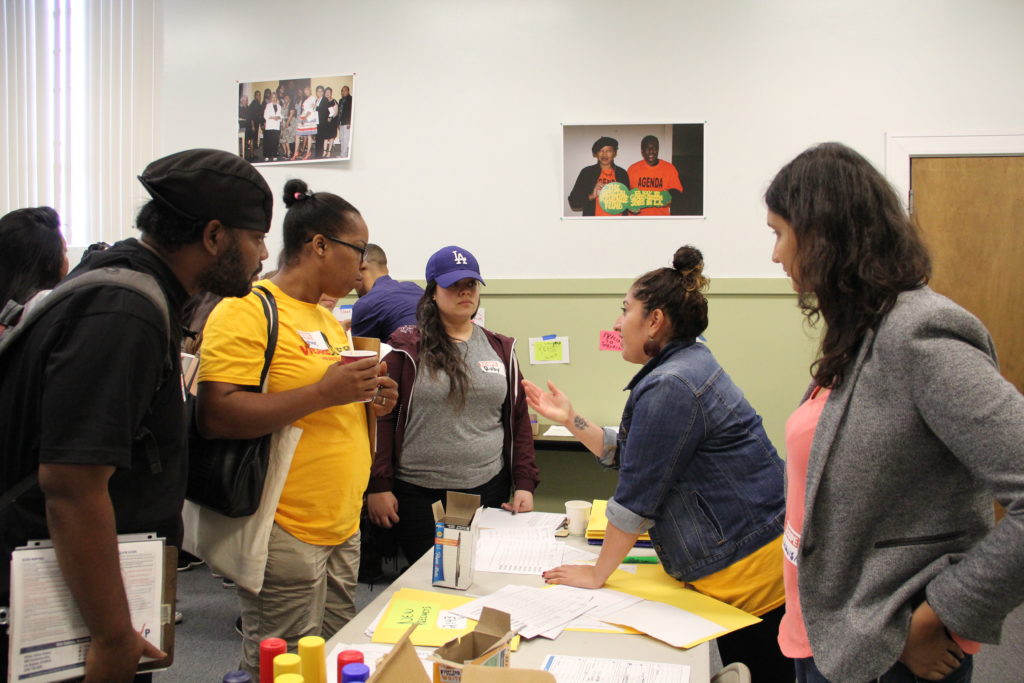
SCOPE volunteers checking in with organizers before going out to door knock.
At SCOPE, our members’ experiences attest to the power of a peer-to-peer civic engagement model and to the importance of sustaining those relationships beyond election cycles. We know that daily engagement with friends, family, neighbors and elected officials builds community power to win campaigns that benefit South Los Angeles residents. But as the 2016 general election nears, we have seen increasing coverage on the declining status of civic engagement in the United States–especially as related to youth. To counter the mainstream media narrative, we asked ourselves: Do the news clips and headlines ring true with the experiences of youth in South and Southeast Los Angeles? Below, we summarize some research on civic engagement and highlight stories of youth-focused civic engagement from two of our Los Angeles Equity Alliance organizations, SCOPE and Communities for a Better Environment (CBE).
“Millennial” Civic Engagement in the U.S. and California
Most mainstream media reporting paints a dire picture of the status of civic engagement of “Millennials,” the term often used for 18 to 34-year-olds. The narrative is that young voters have now become a larger share of the electorate but are not participating as much: A Pew Research Center blog post on youth turnout, for example, laments that, even with increases in voter registration, it will be a very long time before the Millennial vote has any power to sway elections again. This is because even though youth had significantly higher turnout rates in the 2008 and 2012 general elections than in previous cycles, the Center for Information and Research on Civic Learning and Engagement (CIRCLE) at Tufts University in Massachusetts, has found that youth are not as excited to participate in the 2016 General Election. Kei Kawashima-Ginsberg, Director of CIRCLE, believes this decline in “youth excitement” over electoral politics could explain why there is no decisive majority for any presidential candidate this year.
Fortunately, not all of the analysis on youth engagement is so disheartening. In a report released earlier this year, Dr. Mindy Morales of the UC Davis California Civic Engagement Project analyzed voter turnout data for California and found some positive changes with young voters of color–who are the fastest growing share of the state’s electorate. Even though older and white voters consistently have the highest turnout rates, Black youth between 18 to 24 years old have turned out to vote at much higher rates than white youth of the same age group since the 2008 election. Asian and Latino youth in California experienced increased rates from 2004 to 2008, but the rates declined from 2008 to 2012. The gains were small increases in percentage points, but research on the status of the civic engagement of youth of color is particularly important for California communities, where people of color are now the majority of the state’s population and face many institutional barriers to civic engagement and to socioeconomic opportunity.
In a 2014 report written jointly by the UCI Community & Labor Project and the UCLA Labor Center, the authors argue that demographic change in the state is creating critical opportunities for civic engagement and social change. Nevertheless, in order to take advantage of those opportunities, communities of color must continue to engage not only in electoral politics but also in other avenues of civic engagement. By engaging in grassroots community organizing, driving reform of political systems and structures, and initiating community-based research, we can build community power to win campaigns that benefit our communities. These are strategies that can be particularly useful in elevating the political consciousness and increasing the civic engagement of youth of color; we’ve seen it in the research and heard it in the stories of youth.
Youth Civic Engagement in South L.A. On and Off Campus
South L.A. community-based organizations have a long history of engaging youth in developing and winning advocacy campaigns that matter most to them. Community Coalition, for example, began their youth advocacy program, South Central Youth Empowered thru Action (SCYEA), in the 1990s. Youth organizers with SCYEA have won campaigns to improve conditions at South L.A. schools and in their local communities. In the process, they have become strong advocates and community leaders and many have gone on to find academic success.
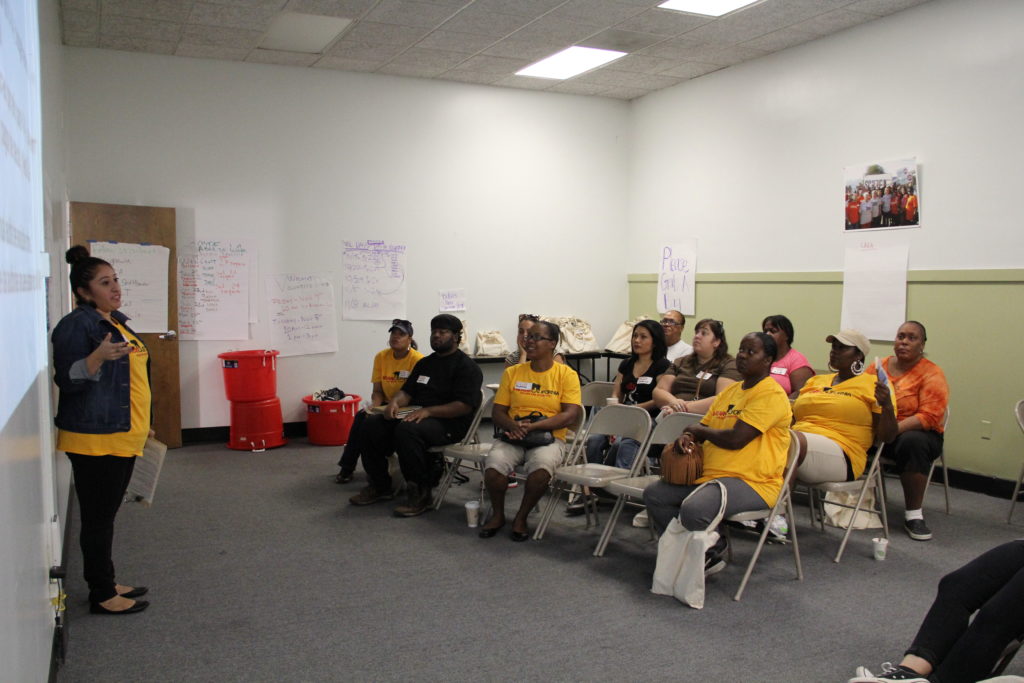
SCOPE organizer, Tracey Beltran, left, giving volunteers an orientation before door knocking.
For SCOPE organizers Ben Toney and Tracey Beltran, efforts to engage local high school and college students in our organization’s work are also a path to developing the next generation of community leaders. Toney regularly works with students from Loyola Marymount University and Occidental College while Beltran has recently focused on increasing SCOPE’s engagement with students at local high schools and at the University of Southern California. Both organizers face challenges in helping dispel misconceptions about South L.A. and about the value of civic engagement, but it’s a challenge they take to heart.
When doing outreach at colleges, Toney looks back to his own experiences as a student at Occidental College and as an intern at SCOPE. He understands that not all students will be able to volunteer; whether it’s because they live too far away, they don’t have reliable transportation, or they might have some hesitations about door-knocking in a community they’re not familiar with. Toney helps students work through those barriers when talking to them during class visits or in one-on-one meetings.
His methods contribute to the larger strategic goal of building up an individual’s leadership so they can build confidence, advocate, and bring positive change to their community. Even if individuals don’t live in South L.A., they’ll have the experience of meeting local community members, being active, and hopefully changing any misconceptions they might have previously had about the neighborhood. With every passing election cycle, Toney and the rest of the SCOPE organizing team will continue to build on their existing relationships at high schools, colleges, neighborhood councils, and parent groups to engage them to become part of the SCOPE family for years to come.
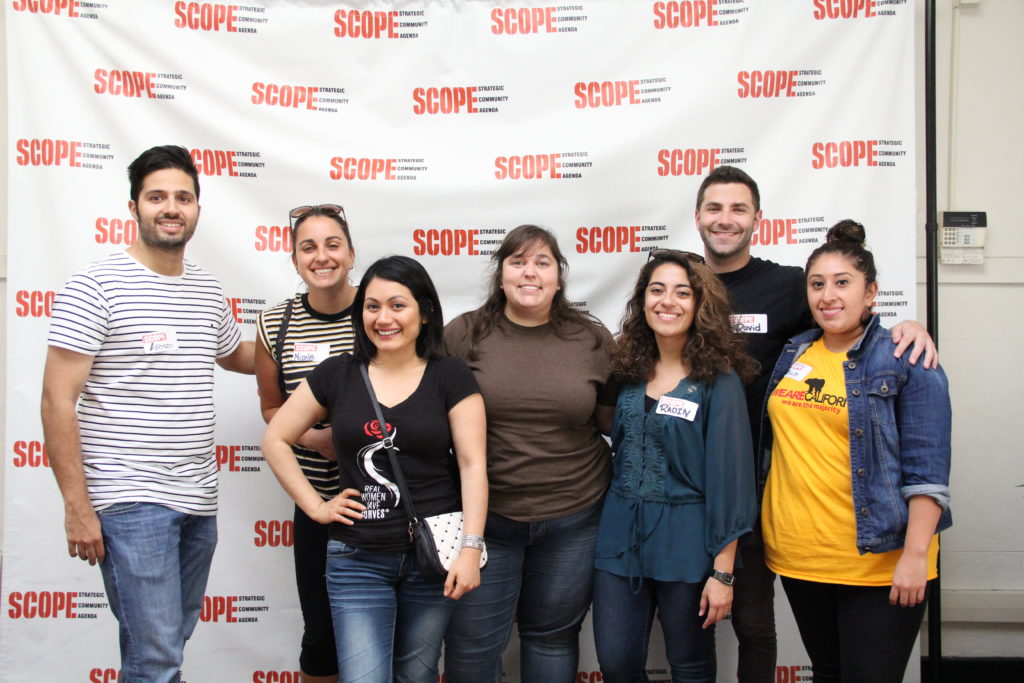
Veronica Rocha, center, and her classmates from the USC Sol Price School of Public Policy.
Veronica Rocha is a masters student at the USC Sol Price School of Public Policy. She’s lived in South L.A. for a year now and, while there was a bit of an adjustment period coming from Washington D.C., she’s been pro-active in learning more about her new community and how to best contribute to ongoing civic engagement campaigns.
Rocha connected with Tracey Beltran, a SCOPE organizer who held student meetings to discuss the issues affecting South L.A. residents. The discussions held during these meetings touched on industrial pollution, environmental health impacts, and displacement of residents. As result of these meetings and in coordination with USC Price Partnership for an Equitable Los Angeles (USC PELA), policy students from USC volunteered to door-knock with SCOPE Action Fund to get out the vote for the upcoming elections. For Rocha, this is a commitment that’s been instilled in her by her mom, who was a teacher and had a saying she would repeat to Rocha: “Elevating one person is elevating all people.” Rocha continues to live by that mantra and it’s evident in her commitment to engaging with students on her campus and with the South L.A. residents she met in her time door-knocking. The one-on-one conversations she had with residents varied, but it was clear that folks were invested in the future of the community and were glad to see someone like Rocha engaging those who might not have the time or be as politically active.
Rocha views meeting with Beltran and volunteering with community-grounded organizations like SCOPE Action Fund as strategies to further engage her classmates. She explains that it’s easy for individuals to be boxed into the issues that are most important to them, but it’s in getting out of those boxes and connecting with others and their struggles that they can grow as both students and individuals.
Youth Civic Engagement in Southeast LA Environmental Justice Campaigns
Through the Los Angeles Equity Alliance (LAEA), SCOPE convenes other grassroots organizing and membership-based organizations in the Los Angeles region to build collective power with and for low-income communities of color. Erick Huerta, SCOPE Communications Coordinator, talked with Rossmery Zayas of LAEA-member organization Communities for a Better Environment (CBE) to discuss her experiences. Zayas is a young advocate with an organization focused on environmental justice and on decreasing disparities in health and social outcomes related to toxic industrial land uses in Southeast L.A. communities.
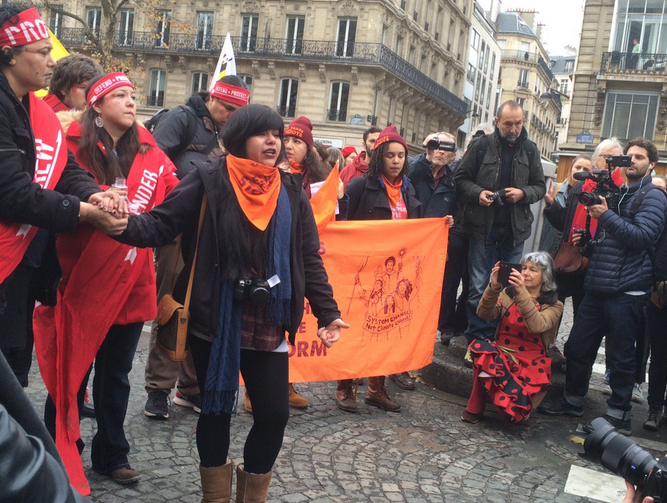
Rossmery, center, speaking at a rally in Paris.
Like most 19-year-olds, Zayas struggles to balance her responsibilities at school, with friends, and with her family. Despite everything she has going on, she makes the time to work with Youth for Environmental Justice (Youth EJ), a group started by youth members of CBE. She credits her two older sisters, who were part of the same program, for first introducing her to the space when she was 14 years old. Since then, her work with Youth EJ and CBE has shaped her development as a young person and an organizer in her community.
Lobbying trips to Sacramento, attending the Democratic National Convention, and going to Paris in 2015 for the 21st Conference of Parties were just some of the experiences that helped her get out of her bubble and make connections to the larger global issues that are impacting communities whose voices are seldom heard. Zayas knows there’s a disconnect between decision makers and communities like Huntington Park, Maywood, Vernon, Cudahy, Walnut Park, Bell, and South Gate, the Southeast L.A. city where she is from, that face high rates of pollution and chronic disinvestment. She understands the need for public accountability and trust so communities aren’t left behind or ignored by the political process.
This year will be her first time exercising her right to vote, but Zayas feels uneasy and has some hesitations about the electoral process. She says: “I feel conflicted about voting because of the politics of the system, but at the same time there are numerous ballot [initiatives] here in the city that are going to impact my everyday life, my family’s life, and the organizing work I do.”
Many of the propositions and measures that will be on the ballot here in Los Angeles will have a direct impact on the quality of life for thousands of families, including hers. She sees her family struggling to make a living as it is, and faces a hurdle many other young people experience during election time: encouraging the rest of her family members to be more engaged in the electoral process. Whether it’s learning about the issues or just registering to vote, Zayas understands that her family’s priorities are focused more on keeping a roof over their head and food on the table.
She sees these and other barriers in the youth she works with. They live in Bell Gardens, Huntington Park, and Downey. Cities that have faced the same kind of disinvestment and environmental racism. “Youth don’t vote because they get disenfranchised, criminalized within their communities, and they don’t see voting as a priority.” While voting or being politically engaged isn’t at the top of their list of priorities, Zayas engages them on a personal level by helping make the connections between policy and their everyday lives. The campaign to shut down the toxic Exide Battery Plant was one of those magic moments in which community members saw their hard work and sustained engagement pay off as they were able to exercise their collective power. By taking ownership of policy and organizing campaigns, community members stay involved and develop as leaders.
Despite the daunting work and pressures, Zayas remains committed to her family, friends, and community in fighting to make their voices heard at the city, state, and national levels. She knows that this isn’t a one-step process and while she still has hesitations about the electoral process, she is learning more about it and doing her part and continue to be engaged.


